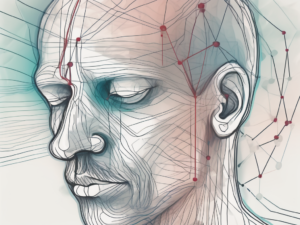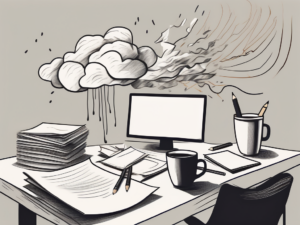If you’ve been feeling confused, forgetful, and unable to focus, you’re not alone. These symptoms can be frustrating and worrisome, but understanding their underlying causes can help you navigate through these challenges and find the clarity you seek.
Understanding the Symptoms: Confusion, Forgetfulness, and Lack of Focus
Defining Confusion: More Than Just Uncertainty
Confusion is often mistaken for mere uncertainty, but it goes deeper than that. It can manifest as a sense of disorientation, difficulty concentrating, and struggling to process information effectively. It might feel like your thoughts are constantly scattered, making it challenging to make decisions or find your way through daily tasks.
Furthermore, confusion can also be accompanied by physical symptoms such as headaches, dizziness, or even a rapid heart rate. These physiological responses can exacerbate the feeling of being mentally overwhelmed, creating a cycle of distress that can be difficult to break without proper support and intervention.
Forgetfulness: When It’s More Than Just Absent-Mindedness
Forgetfulness can happen to the best of us, but when it becomes a persistent pattern, it’s worth exploring further. This type of forgetfulness goes beyond absent-mindedness and can involve regularly misplacing objects, struggling to recall important details, or having difficulty retaining new information. It can be frustrating and impact your daily life.
In addition to the cognitive aspects, forgetfulness can also have emotional consequences, leading to feelings of inadequacy, anxiety, or even isolation. The constant worry of forgetting important tasks or information can create a sense of unease that permeates various aspects of life, affecting relationships, work performance, and overall well-being.
Lack of Focus: Beyond Simple Distraction
We all experience moments of distraction, but a prolonged lack of focus can be a red flag. It can make it challenging to stay engaged in conversations or tasks, leading to decreased productivity and feelings of frustration. If you find yourself easily getting sidetracked or struggling to complete even simple tasks, it may be time to explore the underlying causes.
Moreover, a persistent lack of focus can impact not only individual performance but also interpersonal relationships. Difficulty maintaining attention during conversations or activities can lead to misunderstandings, conflicts, and a sense of disconnect from those around you. Seeking strategies to improve focus and concentration is crucial not only for personal growth but also for fostering meaningful connections with others.
Potential Causes of Confusion, Forgetfulness, and Lack of Focus
Physical Health Conditions That May Lead to These Symptoms
Confusion, forgetfulness, and lack of focus can sometimes be attributed to underlying physical health conditions. Certain disorders, such as thyroid imbalances or vitamin deficiencies, can affect cognitive function. It’s essential to seek medical evaluation to rule out any physiological causes and explore potential treatment options.
Furthermore, conditions like sleep apnea, which disrupts normal breathing patterns during sleep, can lead to daytime fatigue and cognitive impairment. Additionally, neurological issues such as multiple sclerosis or brain tumors may manifest as cognitive difficulties, underscoring the importance of thorough medical assessment to pinpoint the root cause.
Mental Health Disorders and Their Role
Mental health disorders, such as anxiety or depression, can also contribute to these symptoms. Stress and emotional turmoil can impact cognitive abilities and exacerbate feelings of confusion and forgetfulness. Seek the guidance of mental health professionals who can provide support and help you develop coping strategies.
In addition to anxiety and depression, conditions like bipolar disorder or attention-deficit/hyperactivity disorder (ADHD) can also affect cognitive function. These disorders may require a combination of therapy, medication, and lifestyle adjustments to manage symptoms effectively.
Lifestyle Factors That Contribute to Cognitive Issues
Our lifestyle choices can significantly affect our cognitive abilities. Factors such as poor sleep habits, unhealthy diet, lack of exercise, and excessive stress can impair memory and concentration. Incorporating healthy habits into your daily routine may help improve your cognitive function and overall well-being.
Moreover, chronic substance abuse, including alcohol and drug addiction, can have profound effects on cognitive function. Substance use can lead to memory problems, attention issues, and overall cognitive decline. Seeking professional help and engaging in substance abuse treatment programs are crucial steps towards restoring cognitive health.
The Impact of Confusion, Forgetfulness, and Lack of Focus on Daily Life
Dealing with confusion, forgetfulness, and a lack of focus is a challenging experience that can significantly impact various aspects of your daily life. These cognitive struggles can manifest in different ways, affecting your personal relationships, work or school performance, and overall quality of life. Understanding the implications of these symptoms is crucial in navigating the challenges they present.
Effects on Personal Relationships
Experiencing confusion, forgetfulness, and a lack of focus can strain personal relationships. You may feel frustrated with yourself for not being fully present or engaged, and loved ones may struggle to understand the changes they see in you. Open and honest communication can help bridge the gap and foster understanding and support.
Furthermore, these cognitive difficulties can lead to misunderstandings and conflicts within relationships. Loved ones may misinterpret your forgetfulness or lack of focus as a lack of care or interest, causing tension. It’s essential to address these issues proactively and seek mutual understanding to maintain healthy connections.
Implications for Work or School Performance
These symptoms can also impact your professional or educational pursuits. Difficulty concentrating and retaining information can hinder your performance and productivity. It’s crucial to communicate your challenges with supervisors or instructors, as they may be able to provide accommodations or resources to support your success.
In addition, the impact of cognitive struggles on work or school performance can lead to feelings of inadequacy and self-doubt. Seeking assistance and implementing strategies to manage these challenges is vital in maintaining your confidence and achieving your goals.
Impact on Overall Quality of Life
Confusion, forgetfulness, and lack of focus can have a profound impact on your overall quality of life. These symptoms may leave you feeling overwhelmed and robbed of your ability to fully enjoy and engage with the world around you. Prioritizing self-care and seeking professional help are crucial steps toward regaining control and living a fulfilling life.
Moreover, the emotional toll of dealing with cognitive difficulties should not be underestimated. It’s essential to practice self-compassion and seek support from mental health professionals or support groups to navigate the challenges and maintain your well-being.
Seeking Professional Help: When and Why
When it comes to seeking professional help for cognitive challenges, timing is key. Recognizing the signs that indicate a need for intervention is crucial for maintaining your overall well-being. If you find that symptoms such as confusion, forgetfulness, or lack of focus persist and start to significantly impact your daily life, it’s a clear indicator that seeking professional help is necessary. It’s important to distinguish between occasional lapses in memory and persistent cognitive difficulties that require attention.
Trusting your instincts is paramount in this process. If you feel that something is amiss or not quite right, taking the proactive step of reaching out to a healthcare professional can set you on the path to understanding and managing your symptoms effectively.
Recognizing When It’s Time to Seek Help
If these symptoms persist and begin to interfere significantly with your daily life, it’s time to seek professional help. Recognizing when these challenges go beyond the occasional forgetfulness or momentary distraction is essential. Trust your instincts and take the proactive step of reaching out to a healthcare professional for guidance and evaluation.
The Role of Medical Professionals in Diagnosis and Treatment
Medical professionals, such as doctors or neurologists, play a crucial role in diagnosing the underlying causes of confusion, forgetfulness, and lack of focus. They will conduct a comprehensive assessment, which may include medical history, physical examination, and potential diagnostic tests. Once a diagnosis is made, they will work with you to develop an individualized treatment plan.
Remember, each person’s journey is unique, and there is no one-size-fits-all solution. It’s important to approach this process with patience, self-compassion, and an open mind. While it’s natural to crave instant answers, finding clarity and peace may require time and exploration. Stay committed to your well-being and trust that with professional support, you can overcome these challenges and rediscover your focus and clarity.
Embarking on the path of seeking professional help is a courageous step towards self-improvement and better health. By acknowledging the need for assistance and guidance, you are taking control of your well-being and paving the way for a brighter and more focused future.



